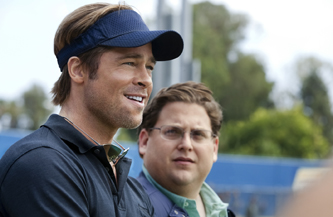|
|
2012 Calvin Awards: Best ScreenplayBy Tom HousemanFebruary 17, 2012
“In the beginning was the Word. And the word was with God. And the word was God.” I'm not sure who first uttered that phrase. It might have been Jesus, but it might have been Aaron Sorkin. It really doesn't matter which one of them said it, since according to the BOP staff the two are one and the same. For the second year in a row Sorkin is standing atop the Best Screenplay category. This time Sorkin teamed up with Steven Zaillian, although the two worked separately on Moneyball, which won this award handily, taking six first place votes. We can't resist Sorkin's richly drawn characters and whip smart dialogue, and Zaillian brought his heart to the movie, making us care deeply about Billy Beane and the Oakland Athletics, despite the fact that our staff is run by Cardinals, Braves and Yankees fans.
One of the strangest stories for any film in 2011 was told by Woody Allen in his latest film, Midnight in Paris. We are not Woody Allen fanboys, and in the past ten years, during which time Allen made approximately 75 movies, he hasn't scored a single mention in our Best Screenplay category. Films from Match Point to Vicky Christina Barcelona to You Will Meet a Tall Dark Stranger (hey, I liked it) didn't earn our love, but Midnight in Paris is different. What sets this film apart is the fact that while the story is complicated, Allen simplifies it, making it about Gil Pender and his emotional journey. There is a strong point of view about nostalgia that is refreshing, considering it feels like Allen is sometimes just telling stories for the sake of telling a story. What I'm trying to say is that we were seriously impressed by Allen, and hope this marks the start of a new trend for him. Another film more defined by its action then its dialogue comes in at fourth this year, and while Drive is a very different film from The Artist, the two have a surprising amount in common. Both films are about quiet men who are very set in their ways, who are forced into a situation that is completely different than what they would expect. For The Driver, he finds himself falling in love with a woman in his apartment building, and sacrifices his job and his safety to protect her. Also like The Artist, Drive could be seen as purely an exercise in style, defined more by its acting and directing than by its script. But The BOP staff found more depth in Hossein Amini's screenplay than that, appreciating the complexity of characters like The Driver, Shannon, and Bernie Rose. Plus, we assume there's a page in the screenplay that just says “Christina Hendricks shows up and is awesome.”
|

|
|
|

|
Thursday, October 31, 2024
© 2024 Box Office Prophets, a division of One Of Us, Inc.


